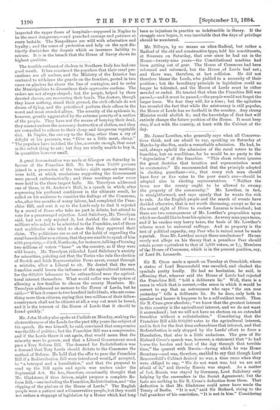Mr: Dillwyn, by no means an ultra-Radical, but rather a
Radical of the old and constructive type, told his constituents, at Swansea on Saturday, that ever since he had sat in the- House—twenty-nine years—the Constitutional machine had been getting out of gear. The House of Commons had been reformed and reformed, but the House of Lords had not ; and there was, therefore, at last collision. He did not therefore blame the Lords, who yielded to a necessity of their position ; but the hereditary'principle in legislation could na longer be tolerated, and the House of Lords must be either mended or ended. He trusted that when the Franchise Bill was passed,—and it must be passed,—the people would not forget the- larger issue. We fear they will, for a time ; but the agitation has revealed the fact that while the aristocracy is still popular, the House of Lords has no foothold in the country. Any strong Minister could abolish it ; and the knowledge of that fact will entirely change the future position of the House. It must keep step, if not with the country, at least with the Cabinet of the- day.


































 Previous page
Previous page